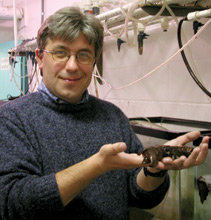 |
Sea
Slugs May Provide Clues to Memory, Learning
downloadable
pdf
A
team of University of Florida and Columbia University scientists
will probe the genetic underpinnings of nerve cells, including
those responsible for learning and memory, through research
on a common sea slug with a very uncommon brain.
 |
Neuroscience
and zoology Assistant Professor Leonid Moroz with one
of the sea slugs he is using to study the role that genes
play in brain function. With the biggest brain cells in
the animal kingdom, the sea slug makes an ideal research
model. |
With
the aid of a nearly $11 million federal grant from the National
Institutes of Health’s National Human Genome Research
Institute, the team will study the sea slug’s unusual
brain to try to unmask the role that genes play in its higher
functions. The research at the newly created Center of Excellence
in Genomic Sciences at UF and Columbia may help improve understanding
of how the brain and its nerve cells function, identify the
genetic basis of brain disorders such as dementia, and pave
the way for new techniques or drugs to improve healthy people’s
ability to learn and remember.
“There is no way to discover real treatments using drugs,
or understand diseases or understand our learning capability,
unless you understand how all the components of the system
work, including the genomics,” said Leonid Moroz, an
assistant professor of neuroscience and zoology at UF’s
Whitney Laboratory for marine biomedical research and biotechnology
and one of the team’s leaders.
The purple-brown sea slug, a mollusk known scientifically
as Aplysia californica that reaches 6 to 7 pounds, is native
to the West Coast, where it eats seaweed. While unremarkable
in appearance, the slug has the biggest brain cells in the
animal kingdom — with the largest measuring 1 millimeter.
That’s far larger than microscopic human brain cells,
making the slug cells simpler to examine and manipulate in
the laboratory, Moroz said. The slug also has only about 10,000
neural cells, compared with 100 billion in humans, greatly
simplifying the task of mapping the connections between cells
and learning how cell networks determine behaviors, including
those related to learning and memory, he added.
The sea slug shares as many as half of its estimated 15,000
to 20,000 genes with people, including genes implicated in
Alzheimer’s and mental retardation, so understanding
how these genes work in the slug’s neural cells will
lead directly to greater insight into how they work in people’s
brain cells, Moroz said.
“This animal provides a beautiful system for research,”
he said. “As an example, three large nerve cells from
this animal placed in a petri dish will do all the jobs that
a neuroscientist can dream of: They will learn, forget and
show us all the genes that make it happen.”
The slug brain’s unique physical characteristics have
made it the focus of research on higher brain functions for
more than a half century. The research already has resulted
in significant breakthroughs — for example, spurring
the development of drugs, now in clinical trials, expected
to reverse memory loss in some elderly people, Moroz said.
The UF and Columbia researchers plan to count and identify
the genes active in single neural cells and learn how they
work together. They also plan to develop new nanotechnologies
for studying genes in single nerve cells. They’ll use
the knowledge, among other things, to probe which genes are
active during learning, and which are actively involved in
memory, both of which the slug, through a range of observed
behaviors such as its defensive reflexes and feeding habits,
has shown itself to be capable, Moroz said.
“This work, which has the potential to radically change
our understanding of the brain, wouldn’t be possible
without the unique features of the slug brain,” said
Peter Anderson, director of the Whitney Laboratory. “It
exemplifies the utility of marine and other comparative models
in modern biological research.”
Leonid Moroz, moroz@whitney.ufl.edu
by Aaron Hoover
|



